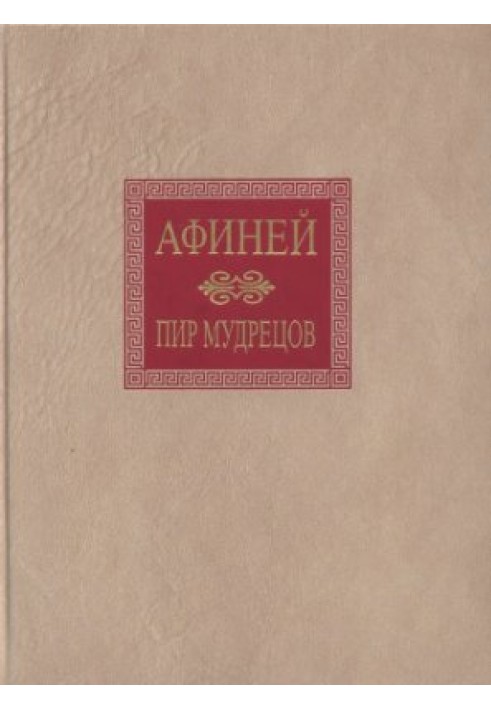Athenaeus. Feast of the Wise. In 15 books. Books IX-XV
 Instant download
Instant download
after payment (24/7)
 Wide range of formats
Wide range of formats
(for all gadgets)
 Full book
Full book
(including for Apple and Android)
A special club edition of the book (150 copies) was produced in serial design and in a dust jacket
This publication completes the publication of the first complete translation into Russian of the famous ancient treatise. (The first volume was published by the Nauka publishing house in 2003.) For a millennium, it was from Athenaeus that Western Europe drew information about the smallest details of ancient life, musical culture, funny historical facts, and philosophical disputes. The book quotes over eight hundred ancient authors. For specialists and a wide range of readers. Table of contents: Athenaeus. Feast of the Wise. Books IX–XVBook Nine. Vegetables: turnips, cabbage, beets, grapes, pumpkins. - Birds. - Piglets. – Comic poets about cooks. – Geese, pheasants, hazel grouse, waders, “red” birds, partridges, quails, swans, wild geese, ducks, suckling pigs, gazelles, peacocks, udders, hares, wild boars, kids. - Learned chef. – Water for washing hands. Book ten. Introduction. Gluttony of Hercules. – Examples of gluttony: Theagenes, Milo, Astyanax. – Digression on athletes (Xenophanes of Colophon). - Further examples of gluttons: Mithridates, Persians, Alcman, Ctesias, Keraunus, etc. - National gluttons: Boeotians, Pharsalians, Thessalians. – Examples of moderation and sobriety: Pythagoras, Plato, Arcesilaus. Gluttony leads to wars. - About drinking: cupbearers, proportions of mixing wine, about unmixed wine, measure in drunkenness, Scolia Alcaeus, more about mixing proportions, additives to wine. Examples of drunkards: Nestor, Proteus, Persians, Philip, tyrant Dionysius, etc. Examples of debauchery. Women's drinking. – National drunkenness: Byzantines, Tirinthians, Eleans, Thracians. - About drunken revelry. – About riddles: examples from comedians, famous riddles, entertaining versification. Book eleven. Introduction. – History of the issue: ancient dishes (Xenophanes of Colophon, Anacreon, Ion). Communication at the table (Alexides of Tarentum, Sappho, Critias). Praise for ceramics. Feasts of the Athenians. Gold and silver dishes. Famous minters. – Catalog of bowls (over 100 articles). Among them one can highlight the Heracleion, the cups of Tericles, the detailed analysis of the cup of Nestor, Scythian cups, vials, and refrigerated cups. – Rivalry between Plato and Xenophon. – Malice and the inventions of Plato. Criticism of his philosophy. Disciples of Plato. Book Twelve. Introduction. About pleasure. The joy of life. – Catalog of countries and cities distinguished by luxury. Among them: Persians, Lydians, Etruscans, Sybarites, Massaliotes, Milesians, Ephesians, Samians, Colophonians, Thessalians, Syracusans, Syrians, Curetes, etc. - A catalog of people famous for luxury. Among them: Ninus, Sardanapalus, Strato, Cotius, Pisistratidae, Pericles, Themistocles, Alcibiades, Pausanias, Archidamus, Callias, Alexander, Antiochus, Polycrates, Dionysius, Demetrius of Phalerum, Lucullus, Lysander, Aristippus, Speusippus, Epicurus, Anaxarchus, Ptolemy, Kinesius and others. Book thirteen. Introduction. Larensky about marriage customs. Bride kidnapping. - About feminine tricks. Wars over women. – Stoics about love. – Myrtil about the hypocrisy of the Stoics. – Kinulka’s attacks on those living with hetaeras. - Praise to the hetaeras. History, prevalence of the custom. Famous hetaeras: Lehena, the tricks of Mania, the wit of Gnathena, Glycera, Laida, Phryne, Myrrhina, Lampito, Plango. Catalog of lovers (Hermesianakt). Poets about love (Euripides, Aeschylus, Critias, Stesichorus, Ibycus, Pindar). About same-sex love. About the whims of love (objects, animals). About the perception of beauty. – Rebuke to the Cynics. Book fourteen. About laughter. Jokers. - Aulos. Aulos in a duet. – About songs: folk songs, nomons, kaliki, tren. – About the singers: rhapsodes, lysiods, magods, kifareds. - About music. Three harmonies. The meaning of music in the life of the ancients. Dithyramb. Music and dancing. Origin of various dances. Music and philosophy. Homer's music. About musical instruments: sambuca, magadida, pectida, exercise equipment, cithara. About the morals of musicians. – Conversation about desserts. – Catalog of pies (35 items). - Stories about what is on the table: pears, dates, grapes, partridges, pheasants, peacocks, guinea fowl, roast pigs, corned beef, cheeses. – More about the art of cooking. Meat stew.Book fifteenth. Game of kottab. – Why do lovers untie their wreaths? – About the benefits of wearing wreaths. – Catalog of wreaths (28 items). - About flowers. – About incense (history, different types of oils). - Drinking songs. Parodies. - About lamps. – About the expression “Ie pean”. – Conclusion.
Data sheet
- Name of the Author
- Афиней
- Language
- Russian
- Translator
- Николай Тимофеевич Голинкевич

















